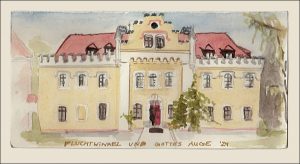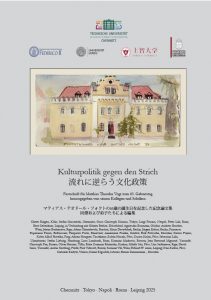German National, Library [Deutsche Nationalbibliothe]:
Dieter Bingen et al. (eds.): Cultural Policy against the Grain. liber amicorum for Matthias Theodor Vogt in honour of his 65th birthday, edited by his colleagues and students (volume II, English version), ISBN 978-3-96100-250-4 (online). Kulturpolitik gegen den Strich. Festschrift für Matthias Theodor Vogt zum 65. Geburtstag, herausgegeben von seinen Kollegen und Schülern (volume I, German Fassung) , ISBN 978-3-96100-249-8 (online) . Universitätsverlag Chemnitz. Chemnitz, Tokyo, Napoli, Roma, Leipzig 2025
Volume II: ISBN 978-3-96100-250-4 (online) https://doi.org/10.51382/978-3-96100-250-4, https://nbn-resolving.org/urn:nbn:de:bsz:ch1-qucosa2-962673
Volume I: ISBN 978-3-96100-249-8 (online), https://doi.org/10.51382/978-3-96100-249-8, https://nbn-resolving.org/urn:nbn:de:bsz:ch1-qucosa2-962658
To download the complete volume [click here]
To download individual articles, see the [table of contents]
Abstract
Listening, Considering, Acting – Cultural Policy against the Grain
What are the premises of today’s cultural policy? What insights can the past, present and theory offer for a contemporary cultural policy? How can art counteract agoraphobia, digital isolation and populist temptations? How can local authorities give their citizens ample space to develop civil society solidarity ‘for the good of the city. For only when the city is well will you be well.’ It should be noted that Jeremiah 29:7 addresses immigrants who are to become citizens in foreign Babylon. Does our cultural policy also achieve this? Are the arts not precisely the place where we can first listen to the other before we think together and then act together?
It is the historical achievement of Matthias Theodor Vogt, in the Free State of Saxony, which was re-established in 1990, to not only conceive the Saxon Cultural Area Act between 1991 and 1995 in a unique process of analysis and dialogue with the state, municipal and civil society levels, but also to have it enshrined in law and, last but not least, to have it implemented with little friction. It was therefore only natural that, on the thirtieth anniversary of the law’s entry into force, the cultural areas of Saxony invited Matthias Theodor Vogt’s colleagues and students to a conference entitled ‘Kulturpolitik gegen den Strich’ (Cultural Policy Against the Grain). We are hereby presenting the results of this conference in a commemorative publication to mark his 65th birthday.
What can art do better and differently than the digital world? What political, structural, economic, and, last but not least, intellectual conditions are necessary for art to develop its own life for the benefit of humanity? The cover image shows Haus Klingewalde, Görlitz, home of the Institute for Cultural Infrastructure Saxony since 1998. Watercolour by Lynne Beal, Cologne, relating to a conversation with Matthias Theodor Vogt about the vanishing point in Alberti: De pictura | De pittura (1435 – 1436). According to Corinna Laude, in the centricus punctus of Alberti’s intromission theory, ‘the orthogonal vanishing lines, the depth lines of the representation, converge “quasi persino in infinito” (as it were out into infinity), it lies in infinity – and thus, according to contemporary understanding, in God’. Which “vanishing points” does today’s post-secular society use?
How can political science in Chemnitz interact in a multidisciplinary, cross-continental manner, always with reference to human beings themselves, with cultural studies in Tokyo and linguistics in Leipzig, with legal studies in Naples and social sciences in Rome? This volume shows that cultural policy studies require a fact-based holistic approach and that this may be achieved by working together.
edited by
Dieter Bingen, Köln; Stefan Garsztecki, Chemnitz; Goro Christoph Kimura, Tokyo; Luigi Ferrara, Neapel; Peter Lah, Rom; Beat Siebenhaar, Leipzig, in Verbindung mit Günter Beelitz, Düsseldorf; Agnieszka Bormann, Görlitz; Andreas Bracher, Wien; Jelena Budanceva, Riga; Adam Chmielewski, Breslau; Maria Davydchyk, Berlin; Jürgen Erfurt, Berlin; Princesse Esperance Fezeu, Bafoussam; Pierpaolo Forte, Benevent; Annemarie Franke, Görlitz; Erik Fritzsche, Dresden; Kazuo Fujino, Kobe; Miloš Havelka, Prag; Adrien Houguet, Taschkent; Zoltán Huszár, Pécs; Sebastian Lalla, Ulaanbaatar; Stefan Liebing, Hamburg; Luca Lombardi, Rom; Katarina Markovic, Boston; Jean Bertrand Miguoué, Yaoundé; Christoph Pan, Bozen; Oliver Reisner, Tiflis; Róża Zuzanna Różańska, Krakau; Mihály Sári, Pécs; Una Sedleniece, Riga; David Simo, Yaoundé; Anton Sterbling, Fürth; Paul Videsott, Bozen; Susanne Vill, Wien; Eduard Werner, Leipzig; Ivan Zadori, Pécs; Gabriele Zaidyte, Vilnius; Kamil Zágoršek, Liberec; Reiner Zimmermann, Dresden
Translations
Translations into English: Matthias Theodor Vogt, Görlitz
Translations into Japanese: Fu Kenryo, Toyooka (Corona) und Matthias Theodor Vogt (Ryūkyū)
Proofreading
Proofreading of English texts: Emma Power, Leipzig
Proofreading of Japanese texts: Shinsuke Hayama, Tokyo
Cover image

Haus Klingewalde, Görlitz, headquarters of the Institute for Cultural Infrastructure Saxony since 1998. Watercolour by Lynne Beal, Cologne (2024)
Layout
Frank Vater, Görlitz. Gesetzt in der / set in Garamond 11p

The conference ‘Kulturpolitik gegen den Strich’ (Cultural Policy Against the Grain) on 24 May 2024, marking the 30th anniversary of the Saxon Cultural Area Act and the Institute for Cultural Infrastructure Saxony, was funded by the Institute’s own resources, co-financed by funds from the Upper Lusatia Cultural Area -Lower Silesia Cultural Area and tax revenue based on the budget approved by the Saxon State Parliament for the promotion of interregional and cross-border cooperation, as well as technical support from the Zittau/Görlitz University of Applied Sciences. The printing of this volume was financed by the Institute’s own funds with the kind support of the Chrysantil Foundation.
Chemnitz, Tokyo, Napoli, Roma, Leipzig
Dieter Bingen et al. (eds.)
Cultural Policy against the Grain (Volume II, English version)
liber amicorum for Matthias Theodor Vogt in honour of his 65th birthday, edited by his colleagues and students edited by his colleagues and students
ISBN 978-3-96100-250-4 (online) https://doi.org/10.51382/978-3-96100-250-4, https://nbn-resolving.org/urn:nbn:de:bsz:ch1-qucosa2-962673
Dieter Bingen et al. (Hrsg.)
Kulturpolitik gegen den Strich (Volume I, German version)
Festschrift für Matthias Theodor Vogt zum 65. Geburtstag herausgegeben von seinen Kollegen und Schülern
ISBN 978-3-96100-249-8 (online), https://doi.org/10.51382/978-3-96100-249-8, https://nbn-resolving.org/urn:nbn:de:bsz:ch1-qucosa2-962658
Digital publication by Chemnitz University of Technology in the European Capital of Culture 2025 in association with Sophia University Tokyo, the Pontificia Università Gregoriana, Facoltà di Scienze Sociali, Rome, the Universitá degli Studi di Napoli Federico II, con il patrocinio del Dipartimento di Giurisprudenza, and the University of Leipzig, Faculty of Philology.

Matthias Theodor Vogt in the role of Fred Noonan at the world premiere of Queen of the Air (composition: Albena Vratchanska, libretto: Vogt) on 8 March 2025 at the Théâtre des Capucins, Luxembourg. Photo: Bohumil Kostohryz, United Instruments of Lucilin, 2025

